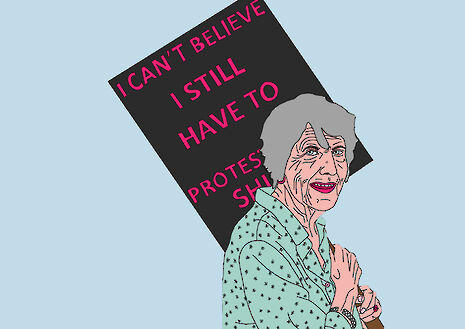Stop talkin’ ’bout my generation
In their latest column, Siyang Wei urges us not to pin all of our hopes on young people

The year between my graduation and return to Cambridge was full of strange new experiences. I moved back home, living with my family and exploring the city I grew up in as an adult for the first time; I got my first full-time permanent job (although still working at a students’ union); and, having mostly exited student life, I started spending significant amounts of time with people both younger and significantly older than I am.
A few months ago, the managers and marketing department at my workplace were strongly advised to attend a university-run lecture called ‘How to talk to Generation Z’ — presumably to teach them to communicate with students (although delivered by a middle-aged man). With all the discussion about generations going on at the office, I realised I didn’t actually really know what they meant, so I had a quick browse on Wikipedia. The news that I am apparently, technically, not a millennial really rocked my world. My manager, it transpired, is a millennial, and was also learning how to talk to me.
In 2019, the language of generations is everywhere. While the term ‘millennial’ was first coined in the late eighties, it has gained particular cultural momentum over the past decade or so with stereotypes of today’s young adults as self-absorbed and sensitive. More recently, notions of ‘intergenerational mistrust’ or polarisation — particularly between reactionary ‘baby boomers’ and progressive ‘millennials’ — have come increasingly to mark our political discourse.
It was the iconic social stature of these two generations that led me to (apparently falsely, although admittedly half-heartedly) identify with the latter for so long. As a mid-late teen, it was rare to go a week without hearing about the new ways in which millennials were destroying Western civilisation; as a university student who happened to have fundamental criticisms of the notion of ‘Western civilisation’ and also to use Twitter, the identifier was a difficult siren song to resist. Given the political transformations of the past couple of years, it seems that I was not alone.
The past couple of years have witnessed a strange reclamation of sorts. Like stepping into a ready-made jacket with ‘radical’ already emblazoned on the back, various left-liberal movements from Youth Strike for Climate to Our Future Our Choice have embraced aesthetics of generational opposition as both a powerful call to action for other young people and a convenient, prima facie proof of the progressivism of their causes. In September this year, the Washington Post published an article explaining “why baby boomers’ grandchildren will hate them” for failing to do enough to tackle climate change; last week, a piece in Varsity argued that the recent high profile of youth protest is a result of “the political systems of previous generations...let[ting] us down.”
I can’t help but feel, however, that this analysis has got it all backwards. Its mistake has been assuming that ‘generations’ really are a useful framework of social or political analysis, rather than a tactical inversion of reactionary attempts by establishment politicians and media outlets to dismiss disillusionment with our current political economy as either upbringing-induced failures of character or merely youthful folly. While it might be nice to believe that we just have to wait for the angry teenagers of today to become the leaders of tomorrow to achieve a different and better world, it also stretches beyond credulity.
The reproduction of global class systems, structures of oppression, and inequality are not the result of previous generations’ activists simply losing hope. When accumulation, legacy, and inheritance are the primary means by which wealth and resources are distributed, the efficacy of individual optimism or idealism is a pipe dream. The younger generation will replace the older generation, and Jacob Rees-Mogg will likely be replaced by Peter Rees-Mogg. Poverty and deprivation, too, are intergenerationally inherited.
This is not to say that generational discourse can offer us no insights at all. While the notion of ‘millennial burnout’ is a mostly unnecessary attempt to reinvent the wheel of capitalist alienation, it’s perhaps interesting to note that even relatively privileged young people are beginning to feel fatigued by neoliberalism. But the ravages of economic extraction and climate breakdown have been evident to working-class people — and particularly to Indigenous peoples and nations of the Global South — for a long, long time. In the West, the radical, anti-imperialist, and socialist movements of yesteryear didn’t simply lose steam or lose hope; activist groups were infiltrated and suppressed by violent force, whole communities were decimated by policies such as the war on drugs, and potentially disruptive ideas are continually co-opted and neutralised by transformation into trite soundbites. It’s possible the stereotype of older people as establishment figures is somewhat bolstered by the fact that so many radicals were silenced, exiled, or killed.
If we want any hope of turning this political moment into one of genuine transformation, this is the history and material reality with which we have to reckon, rather than simply appealing for young people as a collection of individuals to remain abstractly angry and hopeful. We must realise that the problems we face today are not the result of a negligent older generation, but inevitable consequences of global capitalism and imperialism. And the language of ‘millennials’ (and generations as a whole) should stay where it largely began: in marketing and advertising, in BuzzFeed quizzes, and maybe in adults learning that they should talk to young people about memes for the humour value, if nothing else.
 News / Hundreds of Cambridge academics demand vote on fate of vet course20 February 2026
News / Hundreds of Cambridge academics demand vote on fate of vet course20 February 2026 News / Judge Business School advisor resigns over Epstein and Andrew links18 February 2026
News / Judge Business School advisor resigns over Epstein and Andrew links18 February 2026 News / University Council rescinds University Centre membership20 February 2026
News / University Council rescinds University Centre membership20 February 2026 News / Petition demands University reverse decision on vegan menu20 February 2026
News / Petition demands University reverse decision on vegan menu20 February 2026 News / Caius students fail to pass Pride flag proposal20 February 2026
News / Caius students fail to pass Pride flag proposal20 February 2026










